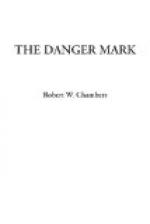It began to occur to him, by degrees, that his own personal importance among his kind might be due, in part, to his fortune. And from the first invasion of that shocking idea matters progressed rather rapidly with the last of the Seagraves.
He said uneasily to Duane, once: “Are you going in seriously for painting?”
“I am in,” observed Duane drily.
“Professionally?”
“Sure thing. God hates an amateur.”
“What are you after?” persisted Scott. “Fame?”
“Yes; I need it in my business.”
“Are you contemplating a velvet coat and bow tie, and a bunch of the elect at your heels?—ratty men, and pop-eyed young women whose coiffure needs weeding?”
Duane laughed. “Are they any more deadly than our own sort? Why endure either? Because you are developing into a country squire, you don’t have to marry Maud Muller.” And he quoted Bret Harte:
“For there be women
fair as she,
Whose verbs and nouns do more
agree.”
“You don’t have to wallow in a profession, you know.”
“But why the mischief do you want to paint professionally?” inquired Scott, with unsatisfied curiosity. “It isn’t avarice, is it?”
“I expect to hold out for what my pictures are worth, if that’s what you mean by avarice. What I’m trying to do,” added Duane, striking his palm with his fist as emphasis, “is not to die the son of a wealthy man. If I can’t be anything more, I’m not worth a damn. But I’m going to be. I can do it, Scott; I’m lazy, I’m undecided, I’ve a weak streak. And yet, do you know, with all my blemishes, all my misgivings, all my discouragements, panics, despondent moments, I am, way down inside, serenely and unaccountably certain that I can paint like the devil, and that I am going to do it. That sounds cheeky, doesn’t it?”
“It sounds all right to me,” said Scott. And he walked away thoughtfully, fists dug deep in his pockets.
And one still, sunny afternoon, standing alone on the dry granite crags of the Golden Dome, he looked up and saw, a quarter of a million miles above him, the moon’s ghost swimming in azure splendour. Then he looked down and saw the map of the earth below him, where his forests spread out like moss, and his lakes mirrored the clouds, and a river belonging to him traced its course across the valley in a single silver thread. And a slight blush stung his face at the thought that, without any merit or endeavour of his own, his money had bought it all—his money, that had always acted as his deputy, fought for him, conquered for him, spoken for him, vouched for him—perhaps pleaded for him!—he shivered, and suddenly he realised that this golden voice was, in fact, all there was to him.
What had he to identify him on earth among mankind? Only his money. Wherein did he differ from other men? He had more money. What had he to offer as excuse for living at all? Money. What had he done? Lived on it, by it. Why, then, it was the money that was entitled to distinction, and he figured only as its parasite! Then he was nothing—even a little less. In the world there was man and there was money. It seemed that he was a little lower in the scale than either; a parasite—scarcely a thing of distinction to offer Kathleen Severn.




